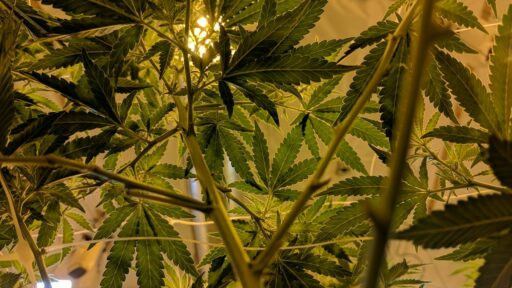Insomnia is more than just a nightly nuisance; it’s a pervasive disorder that can significantly diminish quality of life. With the rise of medical marijuana as a potential treatment, many are curious about how it can unlock the secrets of a restful night’s sleep. This article delves into the scientific underpinnings of cannabinoids’ effects on sleep, practical advice for using medical marijuana to treat insomnia, the connection between cannabis and anxiety relief, safety and legal considerations, and the broader wellness benefits of cannabis.
Key Takeaways
- Cannabinoids like THC and CBD play distinct roles in sleep regulation, potentially improving sleep patterns and alleviating insomnia symptoms.
- Selecting the appropriate cannabis strain and consumption method, including edibles, topicals, and inhalation, is crucial for effective sleep aid.
- Cannabis has anxiolytic properties that can reduce anxiety, which is often a contributing factor to insomnia, thus enhancing sleep quality.
- Understanding the legal status, potential dependency, and side effects of medical marijuana is essential for safe and responsible use.
- Beyond treating insomnia, cannabis can contribute to a holistic wellness routine, including meditation, mood improvement, and overall well-being.
Understanding the Science: Cannabinoids and Sleep

The Role of THC and CBD in Sleep Regulation
The interplay between cannabinoids like THC (delta-9-tetrahydrocannabinol) and CBD (cannabidiol) and sleep patterns is a subject of increasing interest. THC is known for its sedative effects, which may help individuals fall asleep faster. On the other hand, CBD is often associated with promoting a sense of calm and may help reduce sleep disturbances.
While THC can potentially decrease the time it takes to fall asleep, it may also affect the quality of REM sleep, which is crucial for cognitive function. CBD, conversely, does not have psychoactive properties and is being researched for its potential to improve sleep quality without impacting cognitive performance.
The balance between THC and CBD can be critical in regulating sleep. Too much THC may lead to a decrease in REM sleep, while a combination with CBD might offer a more balanced approach to sleep aid.
Several human studies found that cannabis use is not associated with changes in sleep quality or cognitive function. This suggests that the therapeutic use of cannabis for insomnia may not have the negative side effects often associated with traditional sleep medications.
Cannabinoids and Their Effects on Sleep Cycles
Cannabinoids, the active compounds found in cannabis, have been shown to influence sleep cycles in various ways. CBN (Cannabinol), for instance, is a byproduct of THC degradation and is associated with sedative effects that may help individuals fall and stay asleep.
- THC (Tetrahydrocannabinol) is known for its psychoactive properties but also affects sleep by altering the time spent in different sleep stages.
- CBD (Cannabidiol) is non-psychoactive and may reduce sleep disturbances and improve sleep quality.
While individual responses can vary, many report that cannabinoids help in regulating their sleep patterns, leading to a more restful night.
It’s important to consider that the effects of cannabinoids on sleep are not uniform and can depend on the dosage and the specific compound used. For example, while THC may decrease REM sleep, it could increase deep sleep stages, which are crucial for restorative rest.
Scientific Research on Cannabis and Insomnia
Recent scientific studies have begun to shed light on the potential benefits of medical cannabis for those suffering from insomnia. A randomized, crossover trial highlighted in the UK Medical Cannabis Registry assessed the efficacy of cannabinoid medicine compared with placebo, showing promising results for treating insomnia symptoms.
The research community is actively exploring how cannabinoids affect sleep quality and duration. Findings suggest that certain cannabinoids may help in regulating the sleep-wake cycle, offering a natural alternative to traditional sleep medications.
While more research is needed to fully understand the implications, early results are encouraging for individuals looking for a more holistic approach to managing their sleep disorders.
Here is a summary of key findings from recent studies:
- Improved sleep onset and maintenance
- Reduction in sleep disturbances
- Enhanced overall sleep quality
- Potential for long-term sleep pattern regulation
Practical Approaches to Using Medical Marijuana for Insomnia

Choosing the Right Strain for Sleep Aid
Selecting the appropriate cannabis strain is pivotal for those seeking to alleviate insomnia through medical marijuana. Indica strains are often recommended for their sedative properties, which may help in achieving a restful night’s sleep. On the other hand, sativa strains could lead to increased alertness, which might not be ideal for bedtime use. Hybrids, however, can offer a balance between relaxation and alertness, depending on their dominant traits.
When embarking on this journey, it’s crucial to start with a low dose and gradually increase as needed, a method commonly referred to as ‘start low and go slow’. This approach minimizes the risk of adverse effects and allows for the careful monitoring of the strain’s impact on sleep patterns.
While studies suggest cannabis can help with insomnia, it’s important to be aware of the potential for long-term use to negatively influence sleep.
Here are some tips to guide you in choosing the right strain:
- Tip 1: Consider the effects you desire and select a strain accordingly; Indica for relaxation, sativa for alertness, and hybrid for a mix.
- Tip 2: Experiment with different strains to find the one that best suits your needs, as individual responses can vary.
- Tip 3: Consult with a healthcare professional or a knowledgeable dispensary staff member to make an informed decision.
Methods of Consumption: Edibles, Topicals, and Inhalation
When considering medical marijuana for insomnia, understanding the various methods of consumption is crucial. Edibles, topicals, and inhalation each offer unique benefits and experiences. Edibles are known for their delayed onset but prolonged effect, making them a suitable choice for sustained sleep support throughout the night. On the other hand, inhalation methods, such as smoking or vaping, provide more immediate relief but may not last as long.
Topicals, while less common for insomnia, can be beneficial for individuals seeking localized relief without the psychoactive effects. It’s important to consider personal preferences and the specific sleep issues when choosing a method.
While each method has its merits, it’s essential to start with a low dose and gradually increase as needed to find the optimal balance for sleep enhancement without unwanted side effects.
Here’s a quick comparison of the onset and duration of effects for each method:
- Edibles: Onset of 30 minutes to 2 hours, lasting 4 to 8 hours.
- Inhalation: Immediate onset, lasting 2 to 4 hours.
- Topicals: Variable onset, duration depends on the product.
Microdosing for Sleep: Benefits and Guidelines
Microdosing cannabis has emerged as a nuanced approach to using marijuana for sleep-related issues. By consuming sub-perceptual doses, individuals can tap into the therapeutic benefits without the overwhelming psychoactive effects. This method is particularly appealing for those seeking a gentle nudge towards restfulness rather than a potent sedative effect.
When starting with microdosing, it’s crucial to begin with a conservative amount and adjust as needed. This gradual titration helps in finding the sweet spot where sleep is improved without impairing next-day functioning.
Here’s a quick dosing guide to help you get started:
- Low Dose: CBD (5-10 mg), THC (1-2 mg), CBN (2-5 mg)
- Medium Dose: CBD (15-40 mg), THC (3-4 mg), CBN (10-20 mg)
- High Dose: CBD (45-100 mg), THC (5-10 mg), CBN (25-50 mg)
Remember, these are rough guidelines and it’s important to consult with a healthcare professional before beginning any new treatment regimen. As research on cannabis and insomnia continues to evolve, so too will the strategies for its application in sleep management.
The Calming Connection: Cannabis and Anxiety Relief

Understanding the Anxiolytic Effects of Cannabis
Cannabis has long been associated with its ability to induce relaxation, but its impact on anxiety is complex and multifaceted. The anxiolytic effects of cannabis are not uniform, as individual responses can vary greatly. Some users report significant relief from anxiety, while others may experience an increase in anxious feelings or even paranoia.
The primary psychoactive component of cannabis, THC, has been shown to have both calming and anxiety-inducing effects, depending on the dose and the user’s individual biology. CBD, on the other hand, is generally associated with reducing anxiety without the psychoactive effects.
- THC: Psychoactive, can induce both relaxation and anxiety.
- CBD: Non-psychoactive, commonly linked to anxiety relief.
It is essential to approach cannabis use with caution, as the balance between its anxiolytic and anxiogenic effects can be delicate.
Understanding the nuances of how cannabis interacts with anxiety is crucial for those considering it as a treatment option. The relationship between cannabis and anxiety disorders (AD) is particularly important to consider, as habitual use has been linked to the development of AD in some cases.
How Reducing Anxiety Can Lead to Better Sleep
Anxiety, particularly at night, can be a significant barrier to achieving restful sleep. The reduction of anxiety through the use of medical marijuana can significantly improve sleep quality. For many, the calming effects of cannabis, especially CBD, have been shown to promote relaxation and reduce the stress response, which is crucial for transitioning into sleep.
By moderating the body’s stress response and promoting relaxation, medical marijuana may aid in improving sleep patterns and managing symptoms of anxiety.
Understanding the relationship between anxiety and sleep is key to addressing insomnia. Here are some tips for relief:
- Practicing slow, deep breathing exercises
- Engaging in progressive muscle relaxation
- Establishing a calming bedtime routine
These methods, combined with the anxiolytic properties of cannabis, can create a conducive environment for better sleep.
Patient Testimonials: Anxiety Management with Medical Marijuana
The personal experiences of individuals using medical marijuana for anxiety management paint a vivid picture of its potential benefits. Many report a significant reduction in anxiety symptoms, attributing this improvement to the calming effects of cannabinoids like CBD.
A recent compilation of patient testimonials highlighted the diverse ways in which cannabis has been incorporated into anxiety treatment plans:
- Some individuals prefer using CBD-dominant strains to avoid the psychoactive effects of THC.
- Others have found success with balanced strains that offer a mix of THC and CBD.
- A number of patients emphasize the importance of consistent dosing to maintain therapeutic effects.
- The method of consumption also varies, with some opting for edibles for longer-lasting relief, while others choose inhalation for quicker onset.
While scientific research continues to explore the intricacies of cannabis and anxiety, the anecdotal evidence suggests a promising complementary role in anxiety management.
It’s important to note that while these experiences are encouraging, they are not universal. The effectiveness of medical marijuana can vary greatly among individuals, and what works for one person may not work for another.
Navigating the Challenges: Safety and Legal Considerations

Addressing Concerns About Dependency and Addiction
The potential for dependency and addiction to THC, the psychoactive component of cannabis, is a common concern among medical marijuana users, especially those considering it for insomnia treatment. Understanding the difference between physical dependence and addiction is essential. Physical dependence refers to the body’s adaptation to a substance, leading to withdrawal symptoms upon cessation, whereas addiction is characterized by compulsive use despite harmful consequences.
- Physical Dependence: Often conflated with addiction, but it is not the same. It can occur with many substances, including caffeine and prescription medications.
- Addiction: A complex brain disorder involving various factors such as genetics, environment, and personal history.
While cannabis has a lower risk of addiction compared to substances like opioids, it’s important to approach its use with caution and under medical supervision.
Responsible use of medical marijuana for insomnia involves careful consideration of the strain, dosage, and method of consumption. Patients are encouraged to follow medical guidance and to be mindful of their own experiences with the substance. By doing so, the risk of dependency can be managed, allowing individuals to benefit from the therapeutic effects of cannabis without significant concern for addiction.
Legal Status of Medical Marijuana for Insomnia
The legal landscape for medical marijuana is complex and varies widely from one jurisdiction to another. Understanding the legal status of medical marijuana for insomnia is crucial for both patients and healthcare providers. In some regions, medical cannabis is fully legal and accessible for a range of conditions, including insomnia, while in others, it remains restricted or entirely prohibited.
- United States: Medical marijuana lacks approval from the FDA for treating any medical condition, which includes insomnia. However, many states have their own medical cannabis programs that allow its use for various ailments, with specific qualifying conditions varying by state.
- Canada: Medical cannabis is federally legal, and insomnia is recognized as a condition that may benefit from its use.
- Europe: The legality of medical cannabis for insomnia varies, with some countries having established medical programs and others still debating its medicinal value.
It is essential for individuals considering medical marijuana for insomnia to consult with healthcare professionals and to be aware of the legal implications in their area. Navigating the legalities can be challenging, but staying informed is key to accessing treatment safely and legally.
Ensuring Safe Use: Dosage and Potential Side Effects
When considering the use of medical marijuana for insomnia, ensuring safe use is paramount. The right dosage is critical, as it can vary widely among individuals. Factors such as body weight, tolerance levels, and the specific condition being treated all play a role in determining the appropriate amount.
- Start with a low dose and gradually increase as needed.
- Monitor your body’s response to find the optimal dosage.
- Consult with a healthcare professional for guidance.
While medical marijuana can offer significant benefits, it’s important to be aware of potential side effects. These can include drowsiness, dry mouth, and in some cases, anxiety or paranoia. Recognizing and adjusting your dosage can help mitigate these effects.
It’s also essential to consider the method of consumption, as it influences the onset and duration of effects. For instance, inhalation provides quicker relief but shorter duration, whereas edibles take longer to kick in but last longer. Understanding these nuances will help you make informed decisions about your treatment.
Beyond Insomnia: The Holistic Benefits of Cannabis

Cannabis for Meditation and Mindfulness Practices
The intertwining of cannabis and meditation practices offers a unique pathway to enhancing mindfulness and achieving a deeper state of relaxation. By incorporating cannabis into meditation routines, many individuals report a heightened sense of awareness and a more profound meditative experience.
- Selecting the appropriate strain is crucial for aligning the effects of cannabis with the desired meditative state.
- Setting the environment with comfortable seating and minimal distractions can facilitate a more focused practice.
- Starting with a low dose and gradually adjusting based on personal tolerance can help maintain the balance between relaxation and alertness.
The synergy between cannabis and meditation may unlock new dimensions of mental clarity and emotional calmness, without the need for complex techniques or years of practice.
As the practice of meditation evolves, so does the understanding of how cannabis can complement it. The goal is not to escape reality, but to enhance the connection to the present moment, making every breath and thought more intentional and meaningful.
Improving Overall Mood and Well-Being with Terpenes
Terpenes, the aromatic compounds in cannabis, play a significant role in enhancing the sensory experience and have been linked to improved mood and well-being. The presence of specific terpenes can influence the therapeutic effects of cannabis, tailoring the experience to individual needs.
- Myrcene, often found in mangoes, is known for its relaxing properties.
- Limonene, with its citrusy aroma, may elevate mood and relieve stress.
- Pinene can promote alertness and memory retention.
While the exact mechanisms are still being studied, terpenes are believed to interact synergistically with cannabinoids to enhance their effects. This phenomenon, known as the ‘entourage effect,’ suggests that the whole plant may be more effective than isolated compounds.
The potential of terpenes extends beyond mood enhancement, with some studies suggesting benefits for digestion and focus. By choosing strains rich in certain terpenes, individuals may be able to tailor their cannabis use to support specific aspects of health and wellness.
Cannabis as Part of a Comprehensive Wellness Routine
Incorporating cannabis into a wellness routine extends beyond the treatment of specific ailments; it’s about enhancing overall well-being. Cannabis has been recognized for its potential to contribute positively to both physical and mental health. Users often report improvements in areas such as stress relief, mood enhancement, and even pain management.
- Stress Relief: Many find that cannabis helps in reducing stress, which is a key component of a holistic wellness approach.
- Mood Enhancement: The uplifting effects of certain cannabinoids can aid in improving mood and fostering a sense of happiness.
- Pain Management: Cannabis is also used to alleviate chronic pain, which can significantly improve quality of life.
While the journey to wellness is personal and varied, cannabis can be a valuable ally in the pursuit of a balanced and healthy lifestyle.
Safety and moderation are paramount when integrating cannabis into a wellness routine. It’s important to consult with healthcare professionals to ensure that it complements other health practices and does not interfere with any medications or conditions.
Conclusion
As we have explored throughout this article, medical marijuana holds significant potential as a treatment for insomnia, offering a natural alternative to traditional sleep aids. The active compounds in cannabis, particularly cannabinoids, have been shown to improve sleep patterns and alleviate symptoms of insomnia, providing a beacon of hope for those who struggle with sleep disturbances. While further research is needed to fully understand the optimal use and long-term effects, the current insights suggest that cannabis could be a valuable tool in the quest for restful sleep. It is important for individuals considering this option to consult with healthcare professionals and to approach treatment with an informed and cautious mindset.
Frequently Asked Questions
How does medical marijuana help with insomnia?
Medical marijuana contains cannabinoids like THC and CBD that can help regulate sleep patterns and promote restfulness. THC is known for its sedative effects, while CBD can help reduce anxiety, which is often associated with insomnia.
Is it safe to use medical marijuana for sleep disorders?
While many patients report benefits, it’s important to use medical marijuana under the guidance of a healthcare professional. They can help determine the right dosage and method of consumption to minimize potential side effects.
What are the best strains of cannabis for sleep aid?
Indica strains are often recommended for their relaxing effects. However, the best strain can vary depending on an individual’s specific needs and the balance of cannabinoids and terpenes.
Can using cannabis for insomnia lead to dependency?
There is a potential for dependency with any substance, including cannabis. However, using it responsibly and under medical supervision can help mitigate this risk.
Are there legal considerations when using medical marijuana for insomnia?
Yes, the legal status of medical marijuana varies by location. It’s important to check local laws and obtain cannabis through legal and regulated channels.
Can microdosing cannabis improve sleep quality?
Microdosing involves taking small amounts of cannabis to achieve therapeutic benefits without intense psychoactive effects. This approach can improve sleep quality for some individuals without the feeling of being ‘high.’





